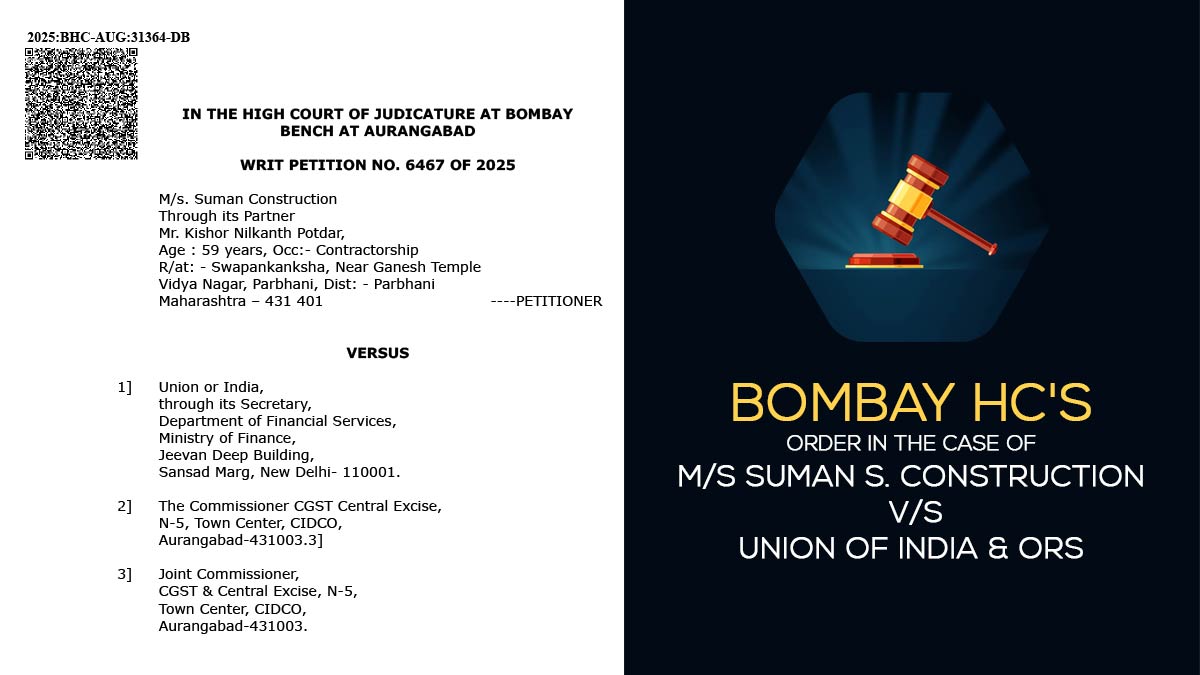
On November 14, 2025, the High Court of Bombay in Aurangabad turned down a request from M/s Suman Construction, a civil contractor registered with the government. The company was disputing a demand for service tax that was related to the road construction projects it completed for government departments.
The problem before the court was whether the taxpayer could invoke a rectification application under section 74 of the Finance Act to claim the service tax exemption for these government road projects, rather than filing a statutory appeal against the Order.
The Case
The business of the taxpayer was road construction projects for different departments within the Maharashtra government. In line with Notification No. 25/2012, dated June 20, 2012. Proceedings were started by the Central GST authorities and validated the service tax obligation for 2015-16. The taxpayer succeeded partly in the appeal for that year, but a second order charging tax for both 2015-16 and 2016-17 was issued afterwards, initiating fresh litigation.
As per the taxpayer, the road construction for government entities is waived from service tax, and the department overlooked the exemption notification. Then the second tax order for 2015-16 was not legal as the previous appellate order had attained finality and thus, re-adjudication breached the doctrine of merger, thereby articulating the rectification application u/s 74 of the Finance Act, 1994 to be the appropriate method since the department had again committed a mistake already settled in earlier proceedings.
Respondents/State Claims
Tax authorities/Respondents presented their claims towards the non-maintainability of the writ petition because of the other statutory remedy of appeal under Section 85 of the Finance Act, 1994 (Appeals to the Collector of Central Excise). Apart from that, it said that Section 74 of the Finance Act, 1994 (Rectification of mistake) allows rectification only of apparent and clerical mistakes, rather than a fresh challenge on merits.
There is no authority of the Joint Commissioner to rectify an order passed via the Additional commissioner, as the law mandates rectification merely via the same authority that issued the original order, and specified that the taxpayer utilises the method of rectification merely to bypass the lapse of the appeal limitation period.
Observation of the Court
Rectification u/s 74 cannot be used as a replacement for appeal, and tax issues comprise factual or substantive problems that need to be decided via the specified appellate procedure instead of writ jurisdiction. The related paragraph of the ruling is reproduced hereunder as;
“This Court also finds merit in the submission of the respondent that the petitioner’s appropriate remedy against the order dated 20.03.2023 lies in filing an appeal under Section 85 of the Act before the Appellate Authority. The writ jurisdiction is discretionary and cannot ordinarily be invoked when an alternate statutory remedy is available unless there is a clear violation of natural justice or lack of jurisdiction which is not established by the petitioner in the present case.”
Read Also:- Bombay HC: Delay in Filing ITR Due to CA’s Advice Does Not Constitute Assessee’s Negligence
Additionally, the ruling stipulated that when multiple adjudication rounds exist, the taxpayer should contest fresh tax proceedings individually and could not rely on previous orders until the establishment of jurisdictional consistency. The court mentioned that.
“In view of the foregoing discussion, this Court is of the considered opinion that the Petitioner’s application dated 02.02.2025, was not a genuine rectification application under Section 74 of the Act but rather an attempt to reopen adjudicated issues through an improper forum. The Joint Commissioner, CGST and Central Excise, Aurangabad has rightly observed that he is not able to rectify an order passed by the Additional Commissioner, Nagpur-1. The impugned order dated 19.03.2025 does not suffer from any illegality, perversity or violation of natural justice warranting interference under Article 226 of the Constitution of India. As far as original order dated 20.03.2023 passed by Additional Commissioner CGST and CEX Nagpur-1 is concerned, Petitioner is at liberty to adopt alternate remedy as available in law.”
| Case Title | M/S Suman S. Construction V/S Union of India & ORS |
| Case No. | WP-6467-2025-2.odt |
| Counsel For Appellant | Mr. J. N. Singh, Advocate |
| Counsel For Respondent | Mr N. T. Tribhuwan, Central Government Counsel, Mr P. P. Dawalkar a/w Mr P. P. Kothari, Advocate for respondent Nos. 2 to 6 |
| Bombay High Court | Read Order |